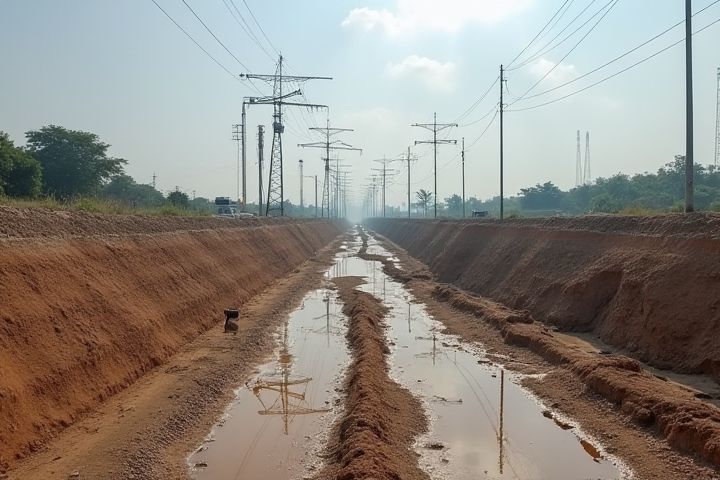
Nigeria's infrastructure projects focus on enhancing transportation, energy, and urban development. Major ongoing initiatives include the Lagos-Ibadan railway, which aims to improve regional connectivity and reduce travel time for commuters. The National Economic Sustainability Plan (NESP) allocates billions to address deficits in healthcare facilities, roads, and power supply. Renewable energy projects, particularly solar and hydroelectric developments, are gaining traction to diversify the energy mix and provide consistent power. By investing in resilient infrastructure, Nigeria seeks to bolster economic growth and improve the quality of life for its citizens.
Government investment and policies
Infrastructure projects in Nigeria are extensively shaped by government investment and strategic policies aimed at enhancing economic growth and improving public services. Key initiatives include the development of transportation networks, energy generation facilities, and water supply systems, which are crucial for fostering trade and attracting foreign investment. The Nigerian government has also introduced public-private partnerships to mobilize resources and expertise, ensuring that these projects are sustainable and efficient. You can observe the impact of such initiatives in urban renewal efforts and rural connectivity programs that specifically aim to uplift underserved regions.
Public-private partnerships
Public-private partnerships (PPPs) in Nigeria are increasingly vital for the development of infrastructure projects, addressing the nation's significant funding shortfall. These collaborations facilitate investment in essential sectors such as transportation, healthcare, and energy, enabling enhanced service delivery and efficiency. By leveraging private sector expertise and capital, Nigeria aims to improve road networks, build modern hospitals, and expand reliable power supply. As you explore opportunities in this growing sector, understanding the regulatory framework and potential risks is crucial for successful engagement.
Road and highway developments
Nigeria's infrastructure projects prominently emphasize road and highway developments, essential for enhancing connectivity and promoting economic growth. Major initiatives include the construction of the Lagos-Ibadan Expressway, which significantly reduces travel time between key commercial hubs. Furthermore, the ongoing rehabilitation of rural roads aims to improve access to remote communities, boosting trade and transportation. Investing in these infrastructures not only facilitates smoother logistics but also underscores the Nigerian government's commitment to a modernized transportation network.
Railway expansion projects
Nigeria's railway expansion projects aim to enhance transportation efficiency and boost economic growth across the nation. The ongoing development of the Lagos-Ibadan railway line, along with the Kano to Kaduna route, represents significant investment in reducing travel time and facilitating trade. This infrastructure initiative not only aims to improve domestic connectivity but also supports regional integration by linking Nigeria with neighboring countries. By prioritizing sustainable methods and addressing safety standards, these projects are designed to transform the Nigerian transportation landscape for the future.
Port infrastructure improvements
Nigeria's infrastructure projects emphasize significant enhancements to port facilities, driving economic growth and trade efficiency. The ongoing initiatives include the modernization of Lagos Port, enhancing cargo handling capacities and reducing turnaround times for vessels. Investments in dredging operations aim to accommodate larger vessels, promoting Nigeria as a key maritime hub in West Africa. Improved port infrastructure not only boosts the nation's logistics sector but also directly impacts local businesses and job creation, benefiting your community.
Power generation and distribution
Infrastructure projects in Nigeria emphasize enhancing power generation and distribution capabilities to address the country's energy deficits. Recent initiatives involve the installation of renewable energy sources, such as solar and hydroelectric plants, aimed at diversifying the energy mix and reducing dependence on fossil fuels. Efforts are also being made to upgrade transmission networks, ensuring that electricity reaches underserved regions and improves overall grid reliability. By investing in these projects, Nigeria aims to stimulate economic growth and improve the quality of life for its citizens through access to consistent and affordable electricity.
Telecommunications expansion
Nigeria's telecommunications sector is experiencing significant growth, driven by extensive infrastructure projects aimed at enhancing connectivity across urban and rural areas. Major investments are being made in fiber-optic networks to improve internet speed and accessibility, which is crucial for supporting digital services and e-commerce. The government, in collaboration with private sector players, is implementing policies to streamline regulatory processes, encouraging foreign investment and innovation in telecommunication technologies. This expansion not only boosts economic development but also enhances productivity and social inclusion for millions of Nigerians.
Urban development and smart cities
Infrastructure projects in Nigeria are increasingly focusing on urban development and the establishment of smart cities, aiming to enhance living conditions and boost economic growth. Major initiatives include investments in transportation networks, waste management systems, and energy solutions tailored for urban environments. The implementation of smart technologies such as IoT devices and data analytics is transforming public services and resource management. These advancements not only improve efficiency but also create job opportunities and foster sustainable urban living for residents.
Environmental sustainability initiatives
Infrastructure projects in Nigeria increasingly emphasize environmental sustainability initiatives to mitigate climate change and promote ecological balance. These projects integrate green technologies, such as solar energy systems and efficient waste management practices, reducing carbon footprints while enhancing local livelihoods. Collaboration between government bodies and private sectors is key in implementing infrastructure that aligns with sustainable development goals, ensuring that urban planning and rural development coexist harmoniously with natural ecosystems. As a result, you can witness a growing commitment to preserving biodiversity and fostering sustainable communities across the nation.
Funding and financing models
Nigeria's infrastructure projects heavily emphasize innovative funding and financing models to address the nation's critical development needs. The government aims to leverage public-private partnerships (PPPs), which facilitate collaboration between private investors and public entities to share resources and risks effectively. With the introduction of infrastructure bonds and blended finance, Nigeria seeks to attract both local and foreign investments, ensuring financial sustainability for long-term projects. By creating a more conducive regulatory environment, Nigeria aspires to enhance its infrastructure landscape, driving economic growth and improving citizens' quality of life.
